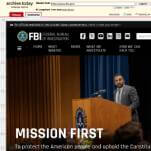“Dropout Nation” starts by showing Brandi Brevard, the “Campus Improvement Coordinator” at Sharpstown High School in Houston. Her slightly Orwellian title only appears the once, and is never actually spoken. (Later in the documentary, her principal and boss says he can’t remember her title; he’s “not much of a title guy.”) This vagueness seems farcical for a moment—we quickly see Brevard in action, trying her best to maintain some kind of engagement with a problem student by picking him up to take to school after he missed his first two classes. Four at-risk students are ostensibly the focuses of “Dropout Nation,” but Brevard comes across as the star, working with and discussing all four students, even letting one live with her and her family for several weeks.
Sharpstown’s students are largely poor and African-American and Latino/Latina, and the school was labeled a dropout factory a few years before the documentary was filmed. One of the school workers claims that 70 percent of the problems they deal with from students are external to academics, a number that I wish were presented either as data or as an estimate. They also say that, at Sharpstown, “everyone does all jobs: counselor, social working, parent.” This is largely what “Dropout Nation” depicts, which is a tremendous emotional strength for it, but it suffers a little bit at showing the big picture.
Still, the four student subjects are certainly worthy of the focus. The first one we meet is Marcus, who is charming and intelligent, but doesn’t regularly show up to school for his first two classes due to family issues keeping him up late at night. Marcus gets probably the most screentime of any student, which makes sense: He seems to be one of Brevard’s favorites (and is the one who ends up staying with her), and due to his football talents, he has one of the theoretically easiest paths to college. He’s also especially interesting, due to his frequent veering between extreme self-awareness and incomprehensibility. One moment, he seems far more able to describe why he doesn’t do well at school than I was at his age, the next, he’s starting a fight on the last day of school that threatens his football and academic career.
There’s also a young woman named Sparkle, who is clearly brilliant but just as clearly defensive and hurt (“I don’t wanna talk about my life, because I don’t wanna cry in front of all these people”), stunting her growth. Lawerence is older, close to graduating, and again, clearly smart enough to do so, but his anger and motivation issues get in his way. Finally, there’s Marco, the only student of the four who doesn’t seem to be tremendously self-aware or intelligent enough that this should be easy. It also turns out that Marco is the only of the four to unambiguously succeed in school over the course of the semester documented.
“Dropout America” doesn’t go into what motivates the kids in the classroom. It shows a presentation of Sharpstown’s inclusion in an “Apollo 20” program to help struggling schools, where the presenter says that one of the goals is to create more engagement with bored students. This includes lengthening the school day and providing 70 minutes of math tutoring for all ninth graders, for example, as well as buzzwords like “accountability” and “human capital.”
There’s some success. Brandi Brevard is shown, on the last day of school, talking about the math scores at Sharpstown being the highest in the district. 70 minutes of tutoring is apparently and unsurprisingly effective. (Meanwhile, in one of those too dramatic for fiction moments, her seemingly successful project, Marcus, is attacking another student, just hours before school lets out for the year.)
Moreover, there’s a confidence that permeates the documentary, which says that success is possible. (The structure may seem similar to The Wire’s fourth season, but the belief in actual answers is a crucial difference.) It comes largely from interviews with the superintendent, who says “The thing about improving schools, we know what to do. It’s whether or not we have the courage to do what we know.” These are strong words, but short on specific details that would counter the problems depicted in “Dropout Nation.” These are smart kids, dropping out or slowing down because they have much bigger problems outside of school, and because school isn’t engaging them. When an administrator tries to tell Sparkle—a Katrina refugee who moved from New Orleans to Houston—that being a student needs to be her most important job, she responds that she needs to “…make sure I can lay somewhere every night. Make sure I can eat every day. That’s my job.”
It’s all the well-intentioned staff of Sharptown can do try to try to give these students a chance. But they’re trapped within a system that treats success as numbers in test scores and graduation/dropout rates, and that believes that lengthening school days will engage students. They’re also at the mercy of poverty and all its associations. If there’s any lesson to be learned from “Dropout Nation,” it’s that improving the educational system cannot be separated from improving society as a whole, no matter how hard some of the best people try. The trying is hopeful, but the connection with poverty is crushing.
Stray observations:
- The superintendent says that $17 million for the Apollo 20 project came from donors and corporations, most notably J.P. Morgan Chase, but also that the school system is running a deficit.
- Frontline follows the “deficit” segment with this text: “In April, Frontline was scheduled to interview the district’s director of dropout programs. The interview was canceled at the last minute. Due to budget cuts, the position had been eliminated the night before.”
- Brandi Brevard’s principal describes her as “half mom, half statistician.” We see much more of the former than the latter, but the latter is jaw-dropping at times, such as a room she has with every student in the school charted in multiple ways on the walls.
- She also runs a “Teen Mom And Expecting Mom Club.” It seems to be well-attended.
- “Dropout America” spends perhaps a little bit too much time discussing some of the dropout data, including the idea that many of its students leave to go to private school. It does lead to a remarkable observations that there are “diploma mill” organizations that, for around $300, will give a quick test and then provide a diploma. This is presented as inherently shocking and terrible, but I’m actually really interested to see the contents of the test.







































